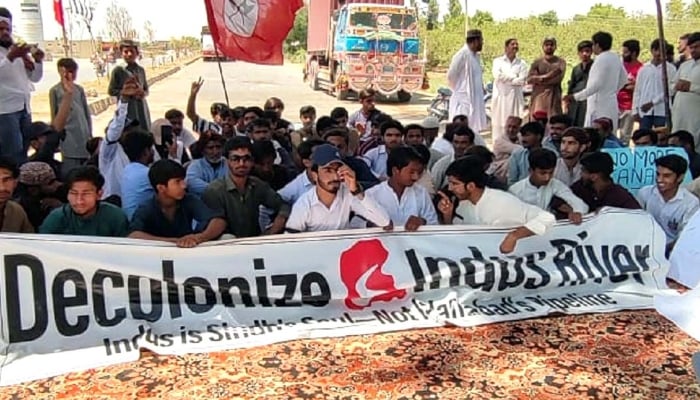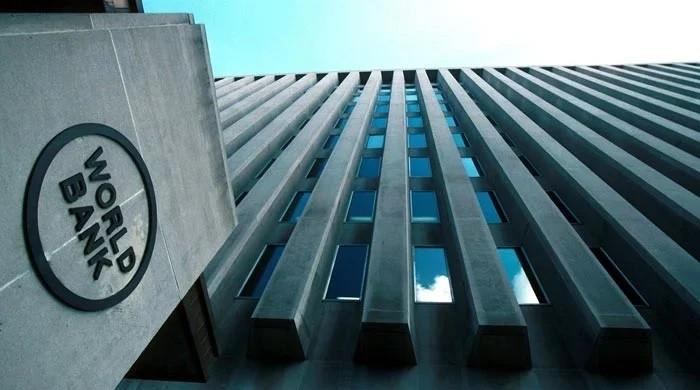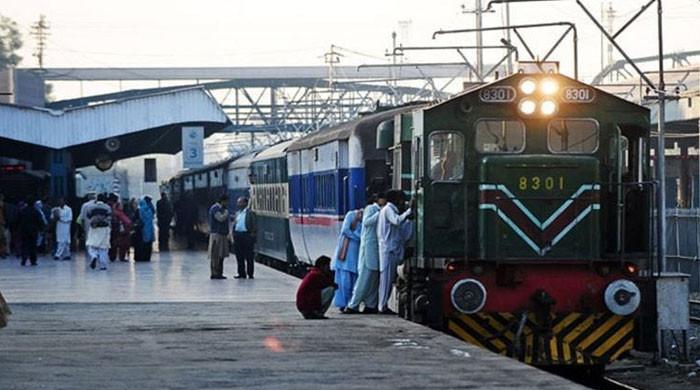Highway blockade in Sindh cripples supply chain network: industrialists
OICCI says companies facing extreme financial losses as shipments still stuck, container backlog grows
April 24, 2025

- Important supply chain connections broken.
- Raw supplies stranded at Karachi Port.
- Tawab warned situation could trigger shortages.
KARACHI: Sending shockwaves across the country's economy, six-day National Highway blockage by Sindh’s protesters has paralysed supply networks and halted local trade and industrial activities, The News reported.
The Overseas Investors Chamber of Commerce and Industry (OICCI) said on Wednesday that companies are facing extreme financial losses as shipments are still stuck and a growing container backlog is turning important trade channels into virtual dead zones.
Currently, over 3,500 vehicles — many of which are transporting export consignments, perishable commodities, and vital industrial inputs — are stuck close to Sukkur. Market supplies are already being disrupted by the total halt in commodities transportation, and shortages are imminent.
Important supply chain connections have been broken by this disturbance. Raw supplies stranded at Karachi Port might force industries in several regions to shut down, whereas, exporters are missing delivery deadlines, which would damage Pakistan's reputation as a trustworthy trading partner and jeopardise future contracts, the OICCI said.
Unless resolved immediately, the blockade could result in widespread industrial shutdowns, job losses, and a prolonged, costly recovery, in addition to damaging Pakistan’s image as a regional trade hub.
The OICCI expressed confidence that the relevant authorities in Sindh and the federal government understand the urgency of the matter and will take swift action to restore the free movement of goods. Uninterrupted trade is essential to supporting domestic commerce, maintaining export competitiveness and ensuring economic stability.
Separately, Khalid Tawab, regional chairperson of the United Business Group (UBG), has called on Prime Minister Shehbaz Sharif to urgently intervene as ongoing protests and road blockades in Sindh disrupt economic activity and threaten the country’s fuel supply chain.
The week-long demonstrations — led by lawyers and political groups — have brought the movement of goods to a standstill, including fuel shipments from Karachi to upcountry regions.
Tawab warned the situation could soon trigger shortages in northern Pakistan and parts of Sindh, with hundreds of tank lorries stranded en-route.
“The situation is getting worse, and if not resolved, it will severely impact our exports and imports,” Tawab said in a statement. “We urge the prime minister to facilitate the movement of tank lorries and cargo amid ongoing blockades.”
Industry sources estimate that more than 800 fuel tankers are currently stuck due to the unrest. Tawab also appealed to the Sindh government to activate local authorities and ensure safe passage for fuel transport across the province.
In a separate statement released on Wednesday, UBG Patron-in-Chief SM Tanveer said that the blockade of the National Highway is severely hindering Pakistan’s export capabilities.
Tanveer expressed deep concern over the disruption, highlighting recent statistics indicating a 12% decline in the nation’s exports in the last quarter, partly attributed to logistical hurdles.
The UBG leader noted the growing anxiety within the business community regarding the ongoing situation and the lack of a clear resolution. “The current blockade is not only affecting our export targets but also damaging the country’s reputation as a reliable trade partner,” Tanveer stated.
He emphasised the critical need for uninterrupted movement of export consignments to meet established goals. “We cannot afford to lose more time and opportunities. The government needs to take immediate action to resolve this issue,” he urged.
Tanveer called upon the Sindh government to engage in negotiations with the protesting parties and persuade them to relocate their demonstrations away from the main highway to ensure the smooth flow of export-related transportation.
“We need to find a solution that balances the rights of protesters with the needs of the economy,” he said, stressing the urgency of a swift resolution for the sake of the country’s overall economic stability and future growth.











